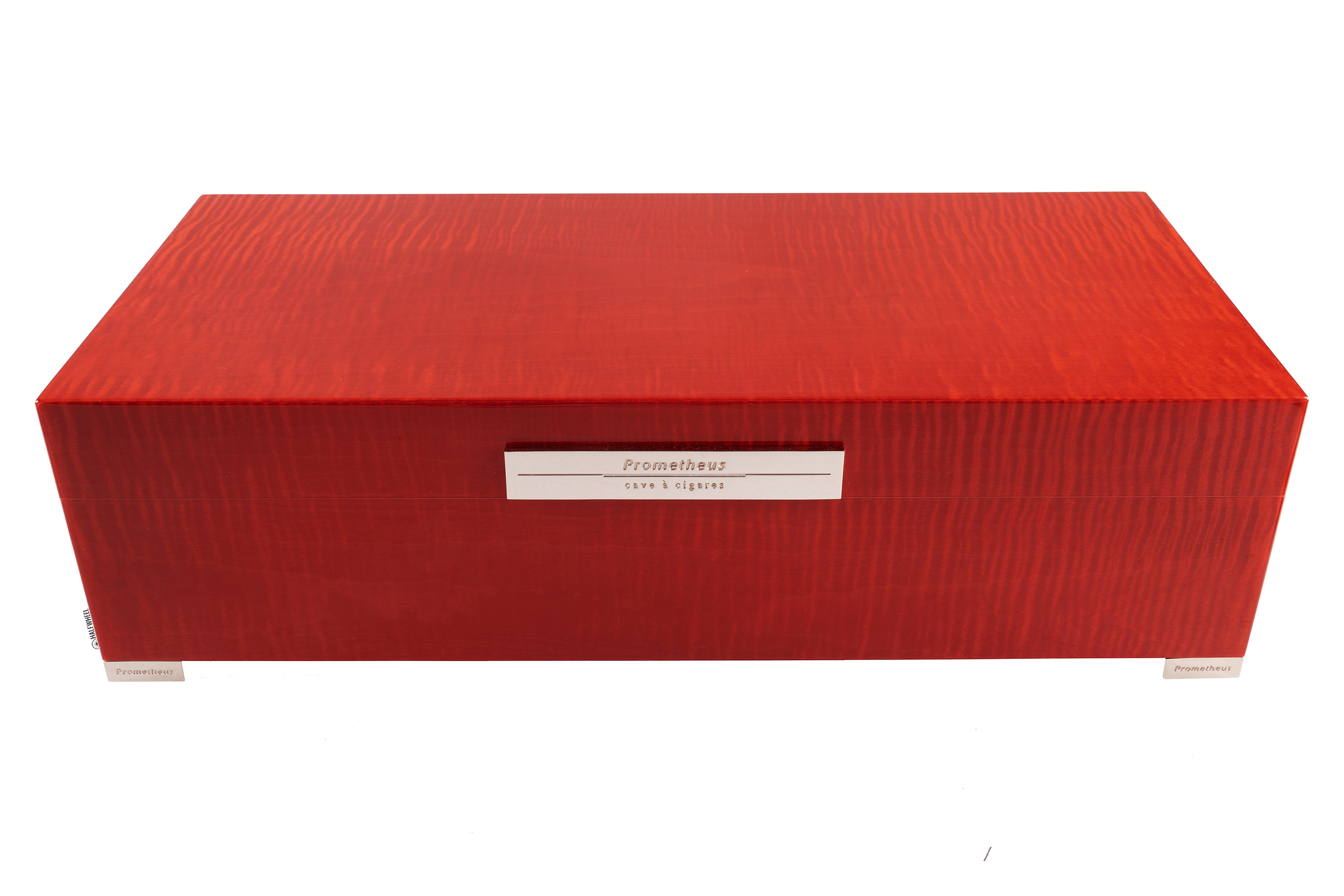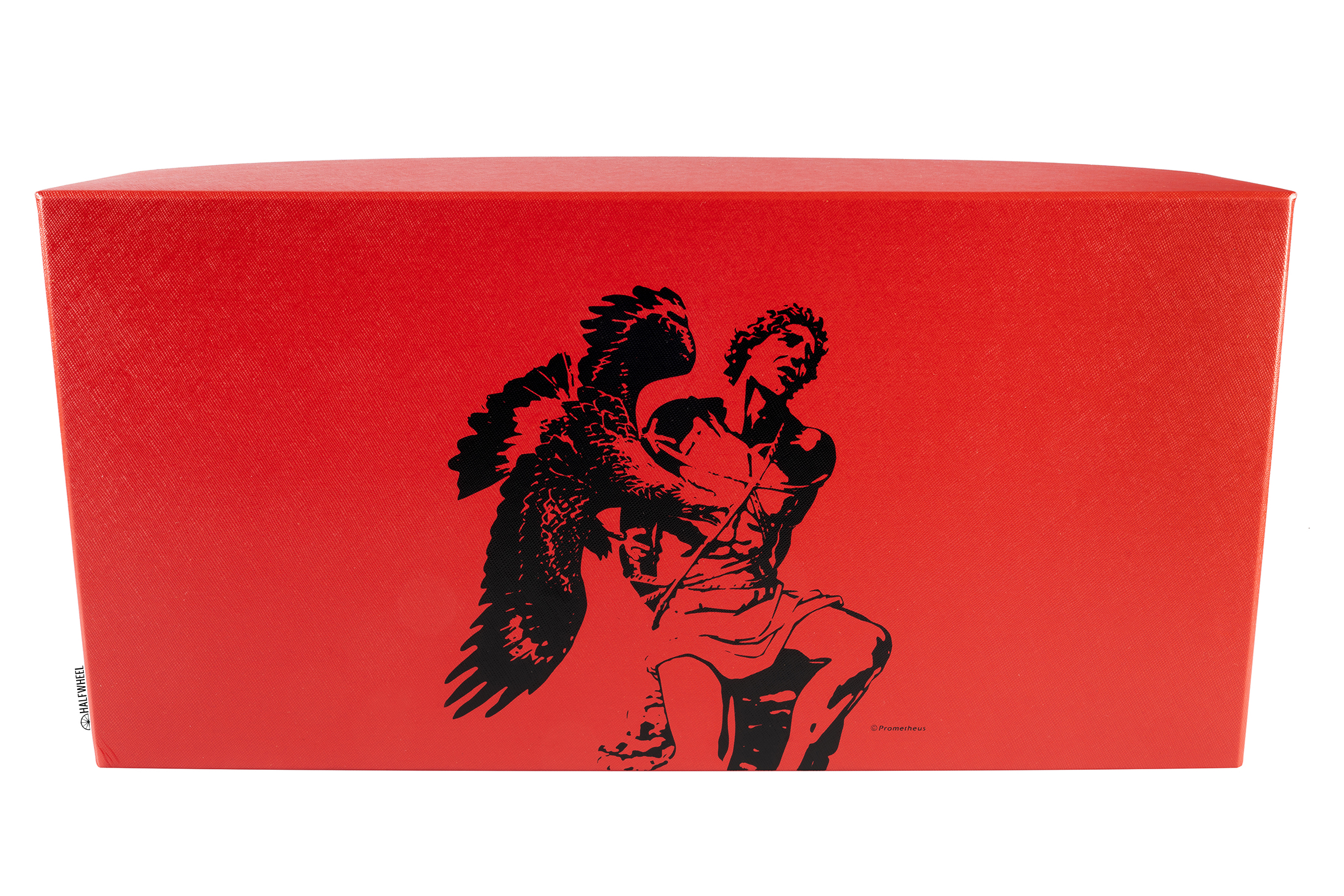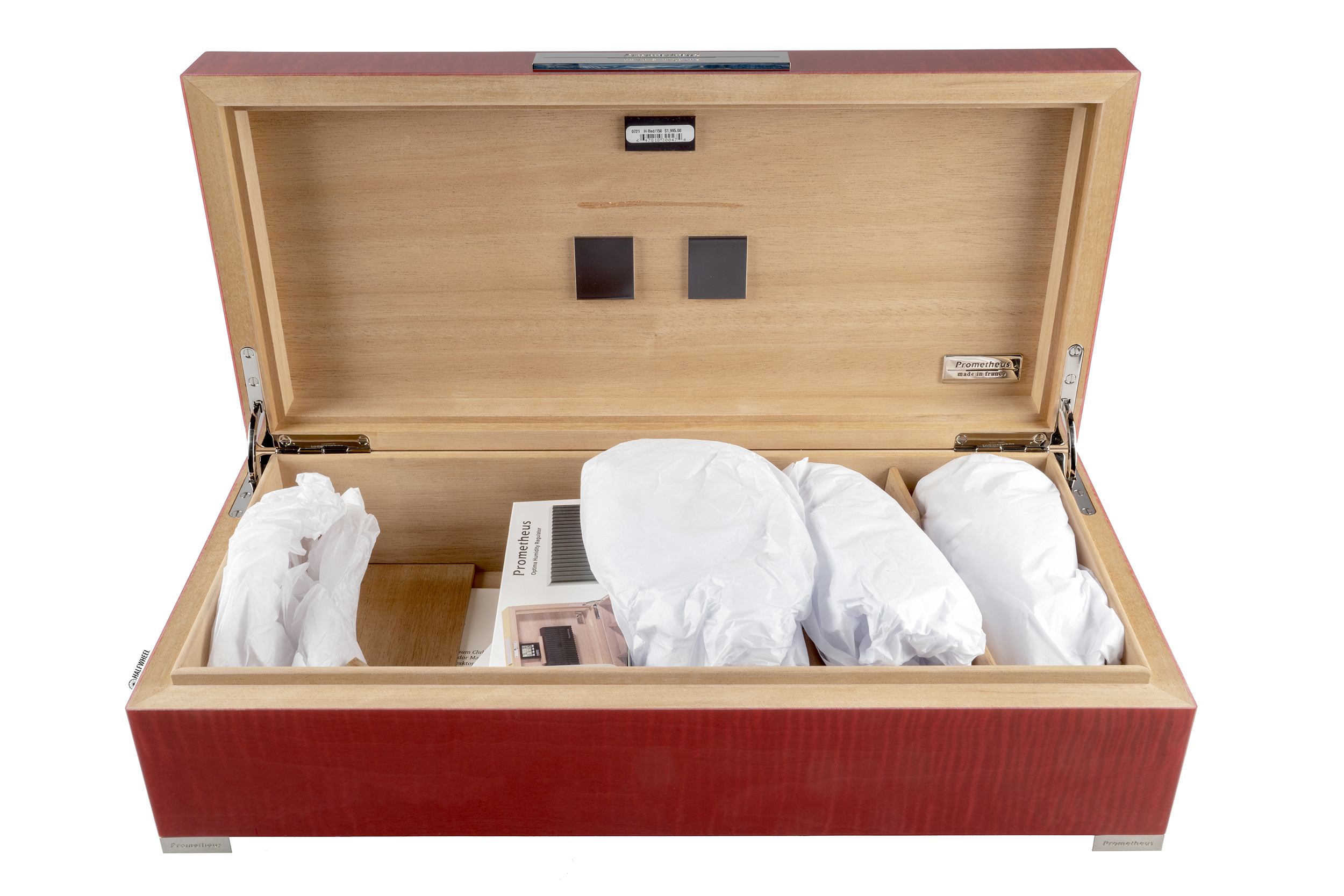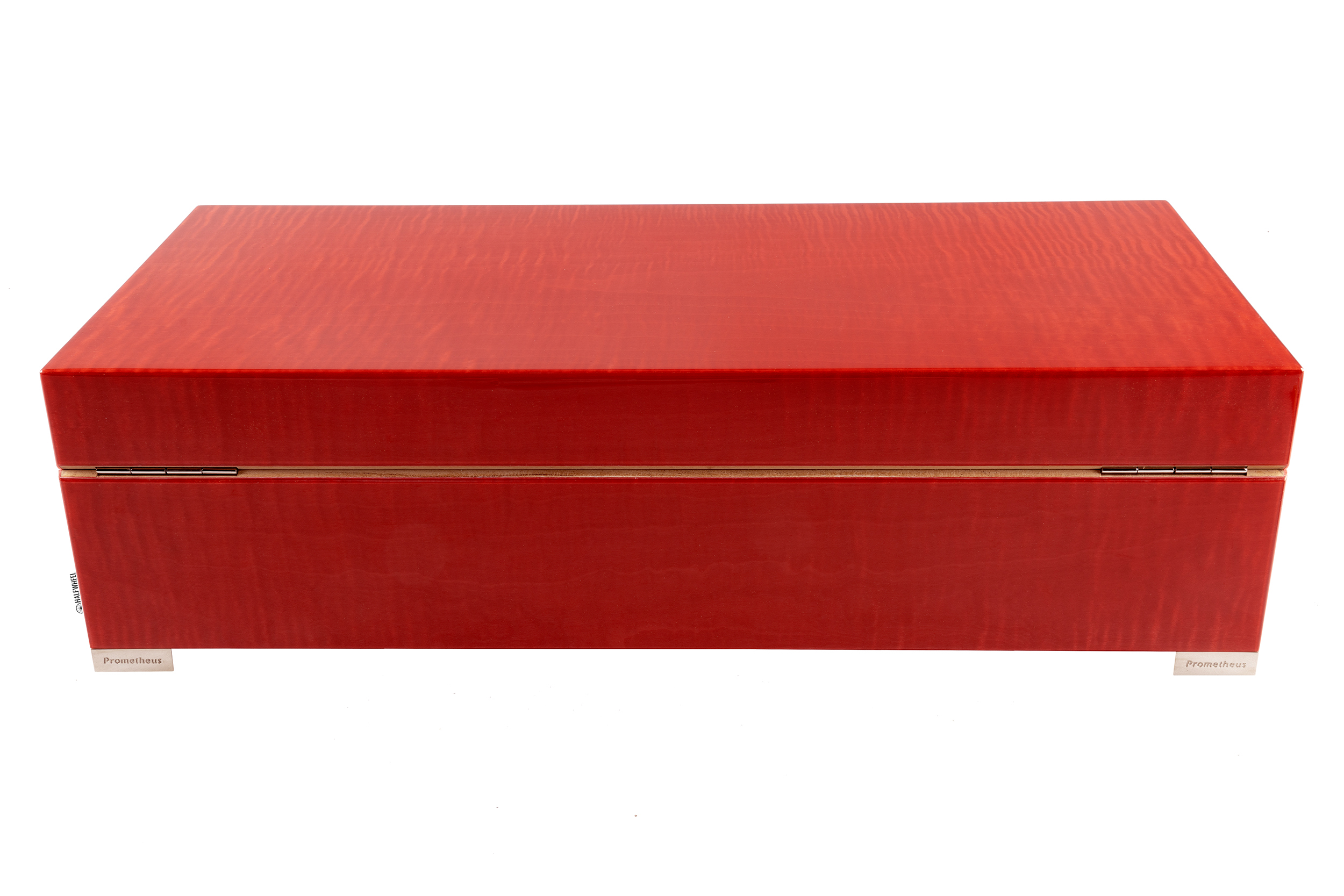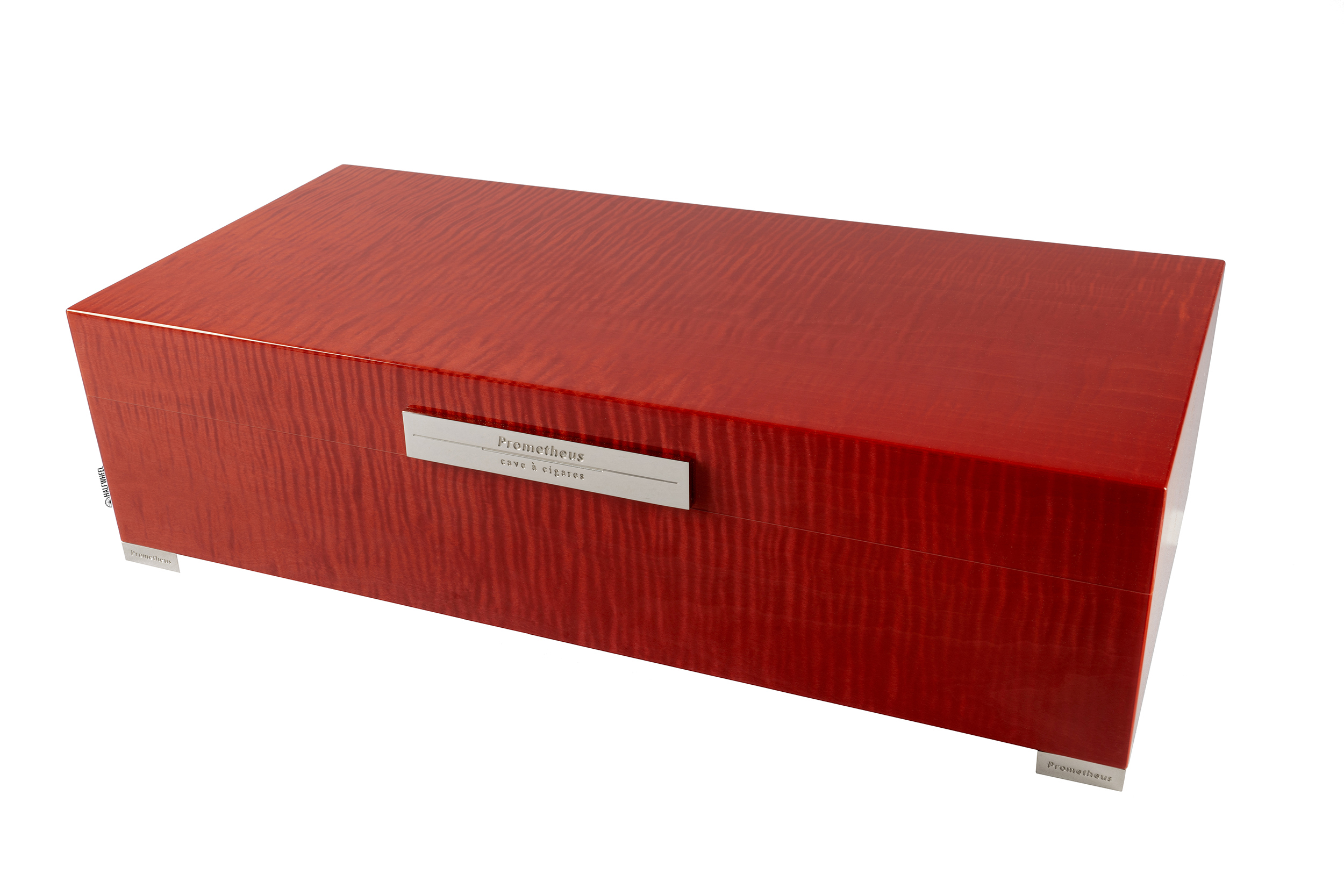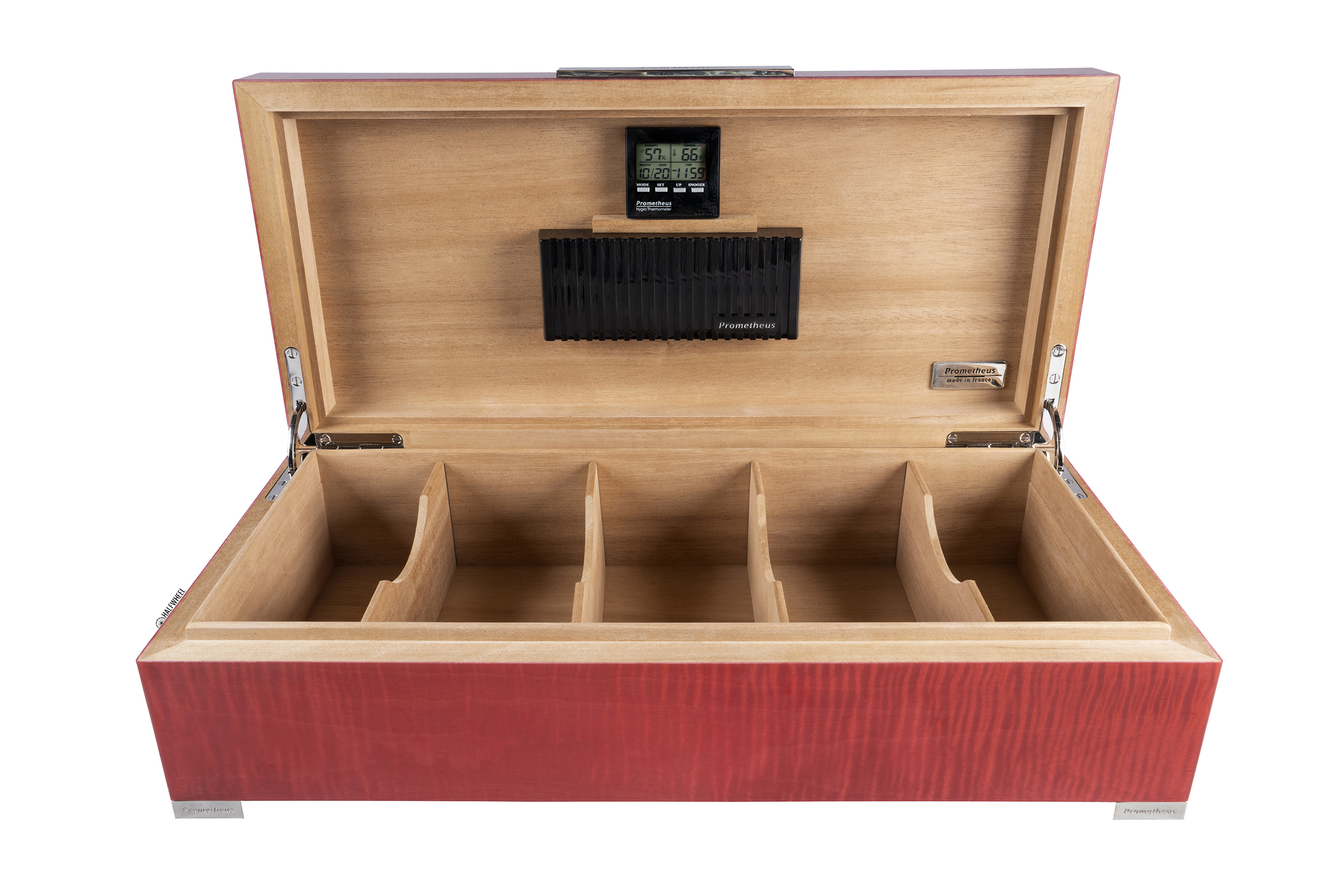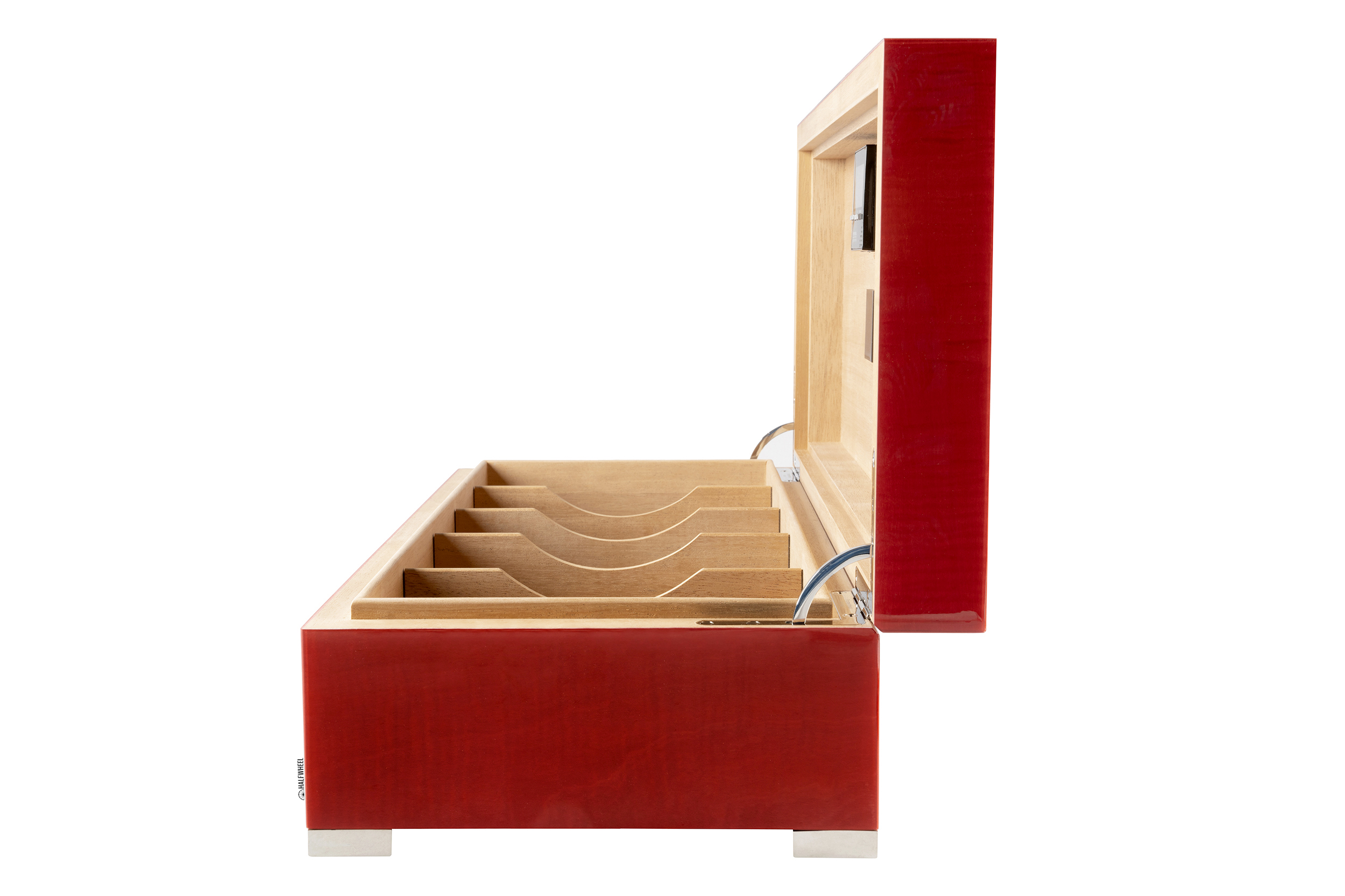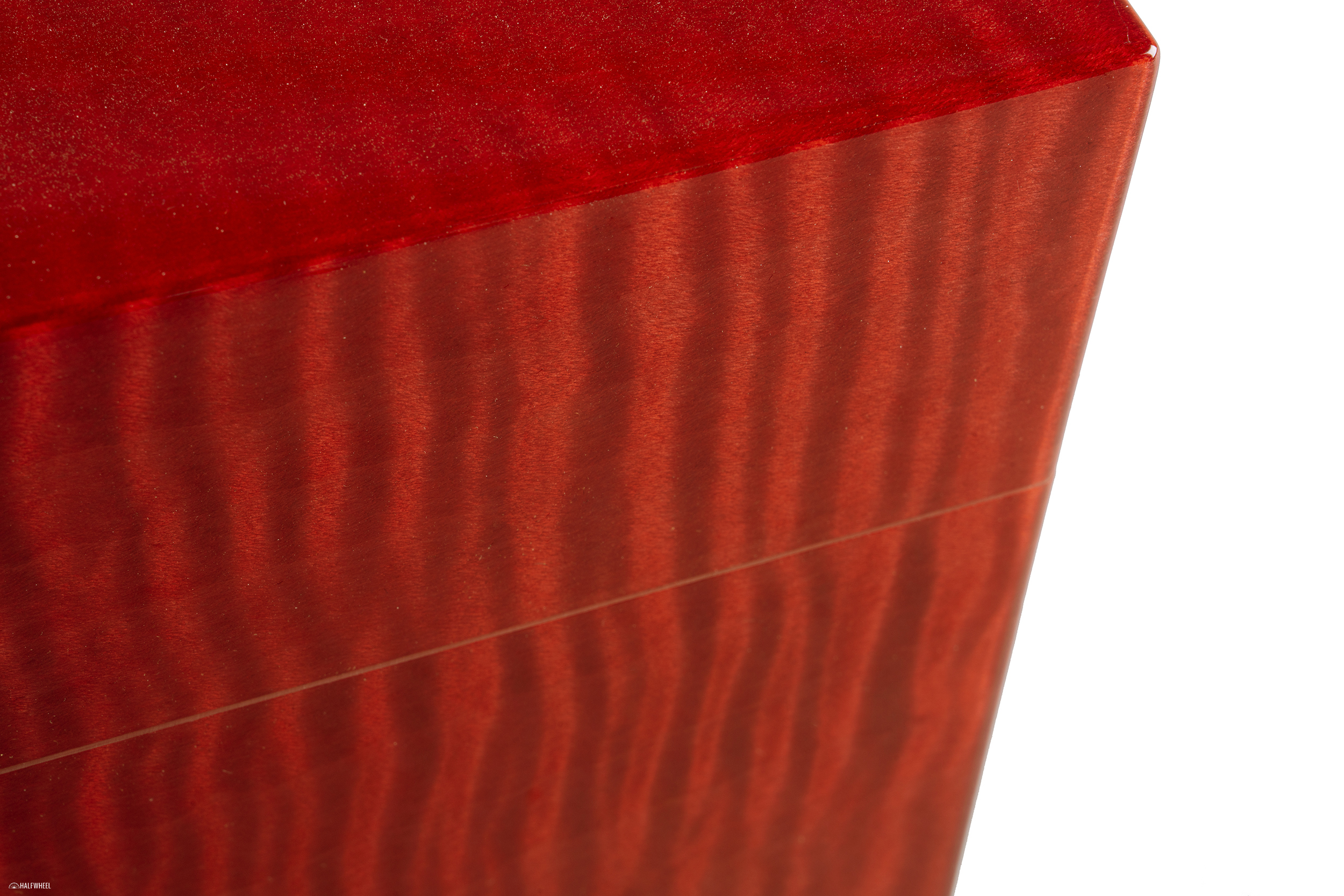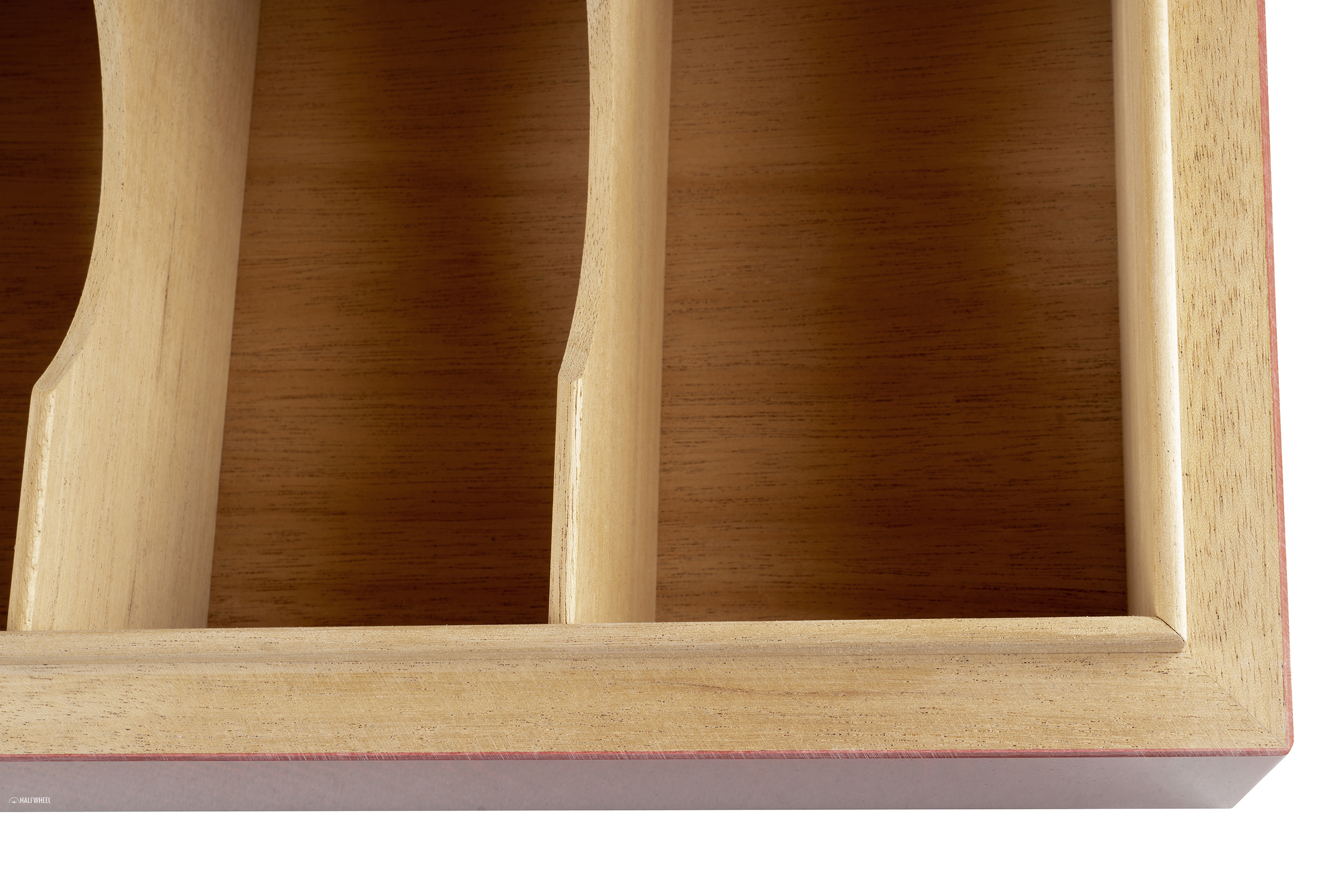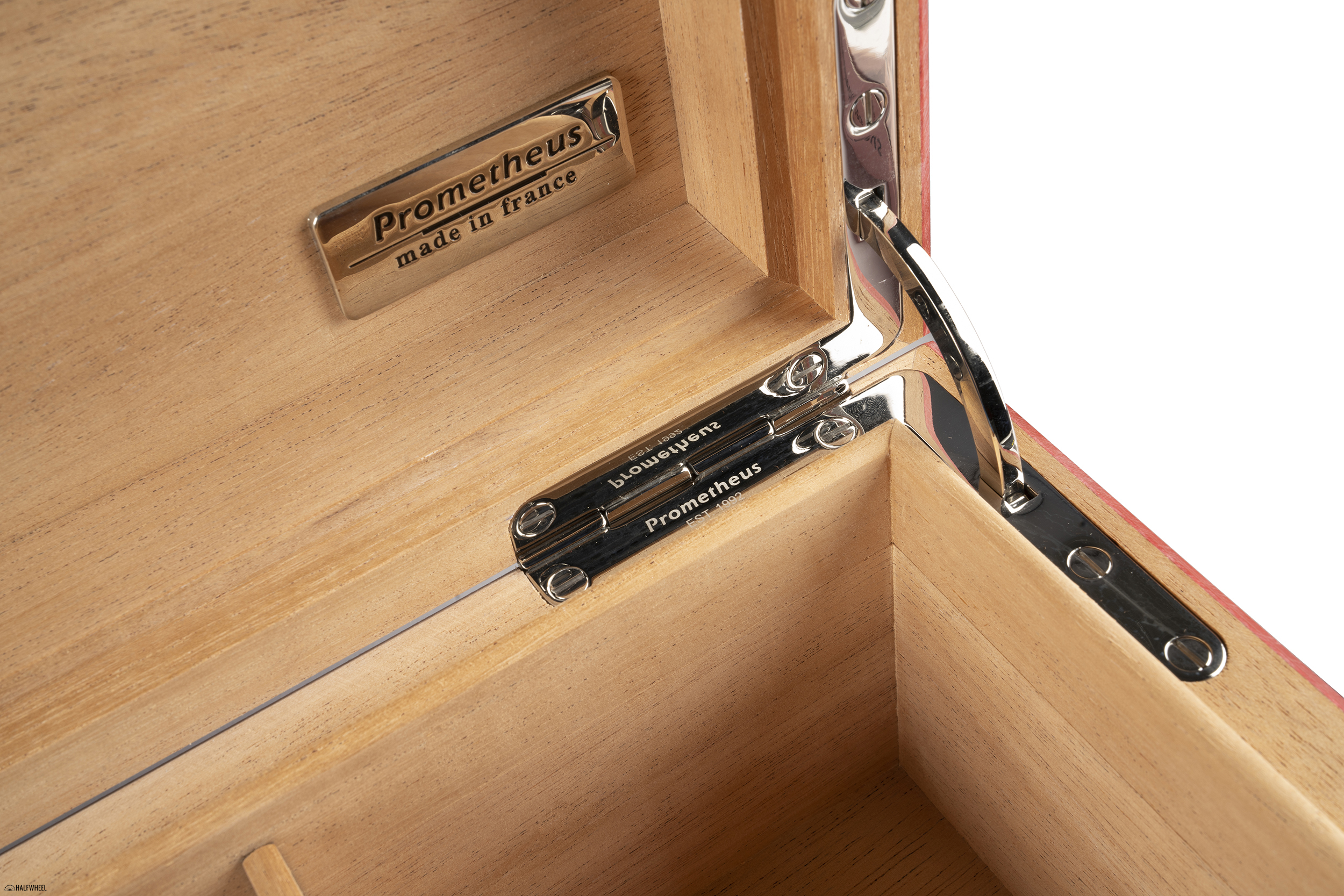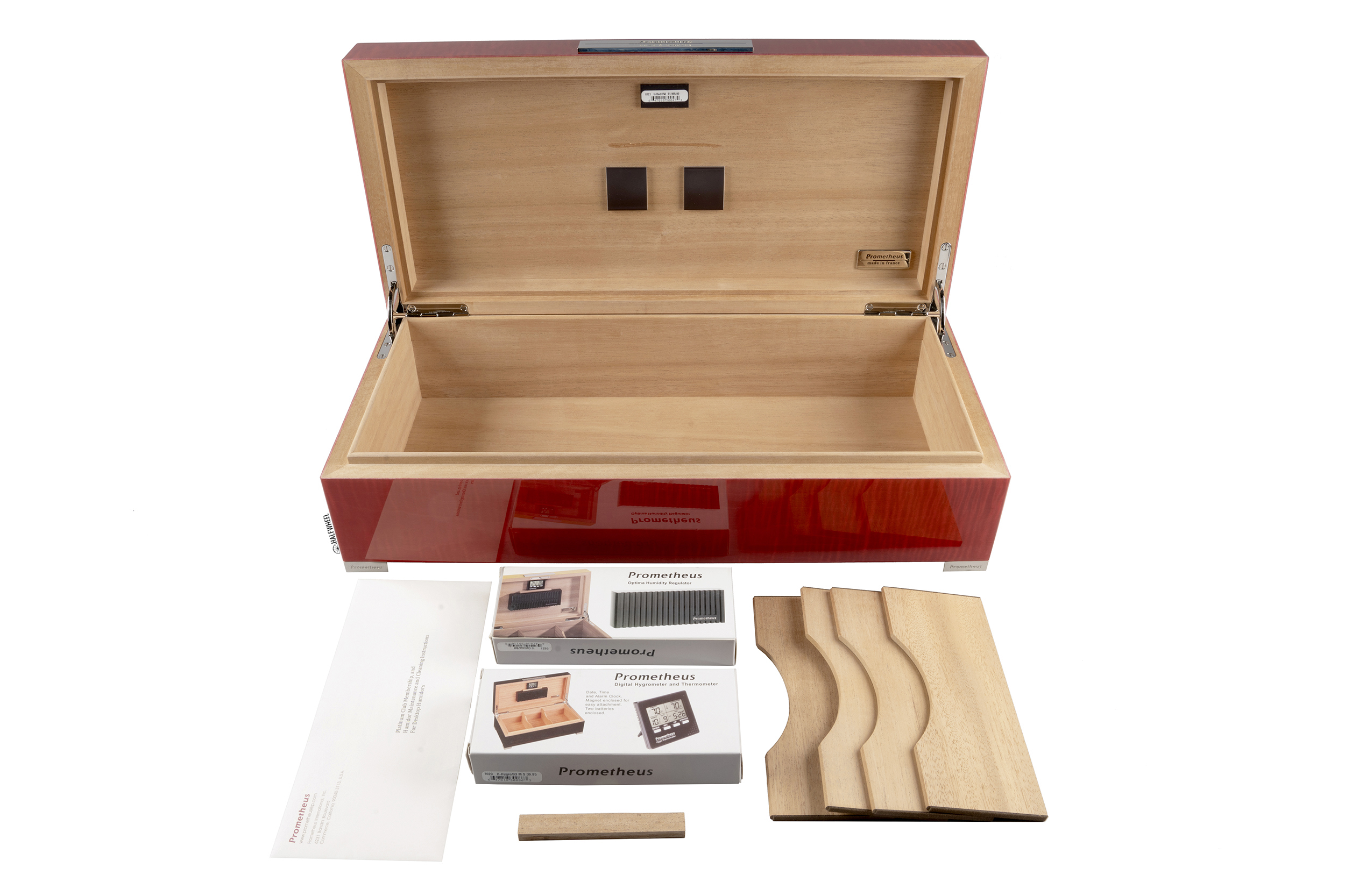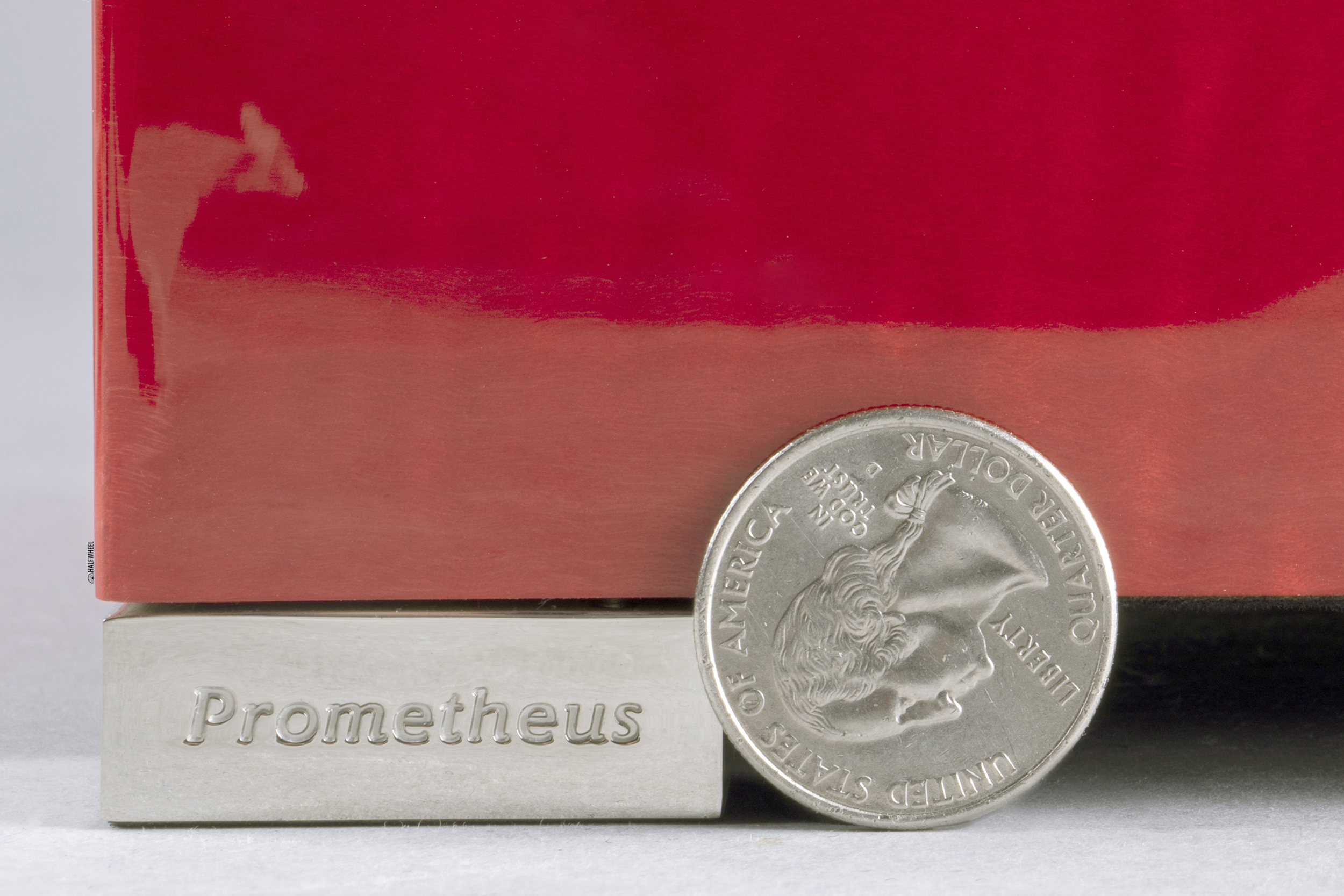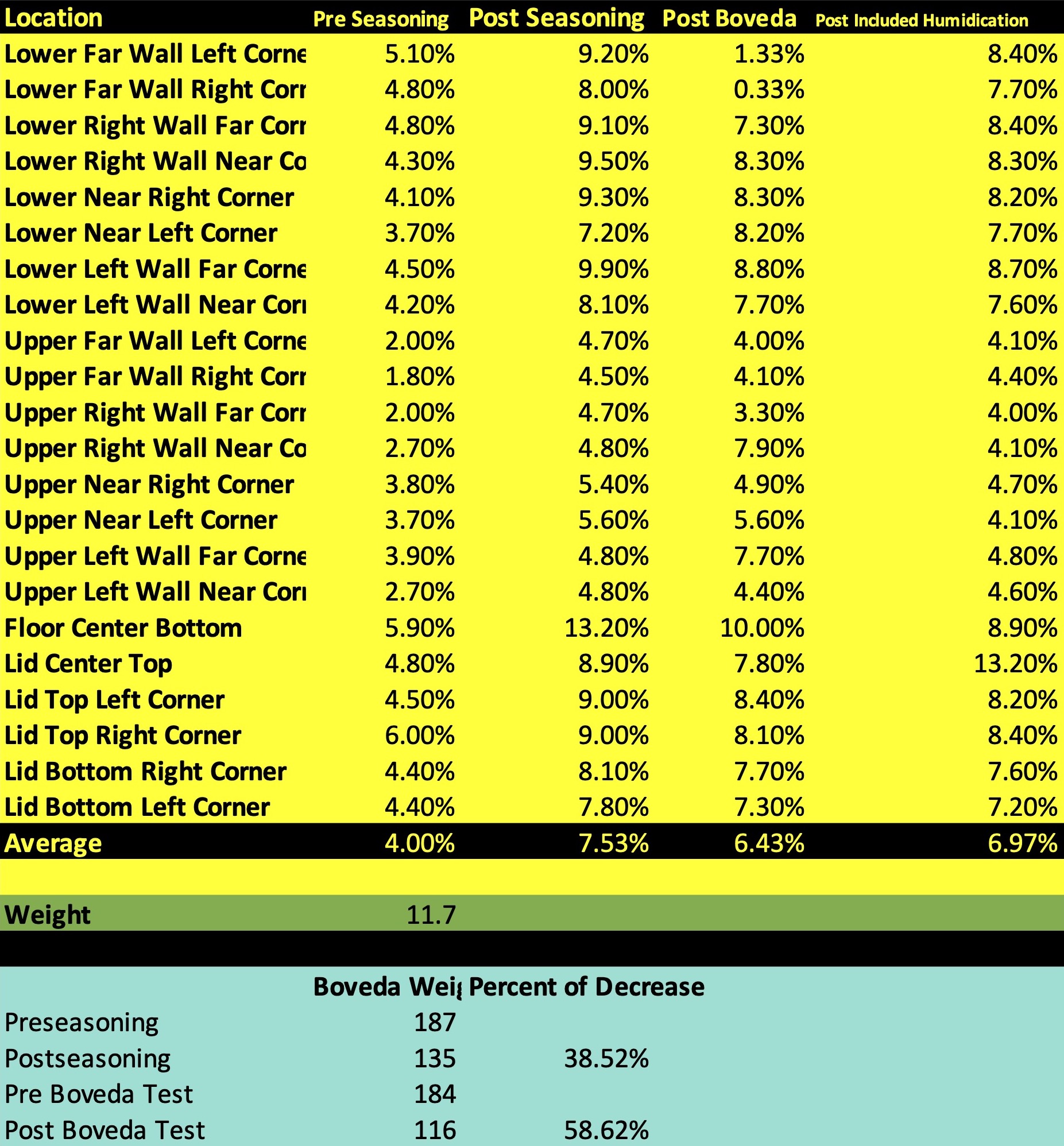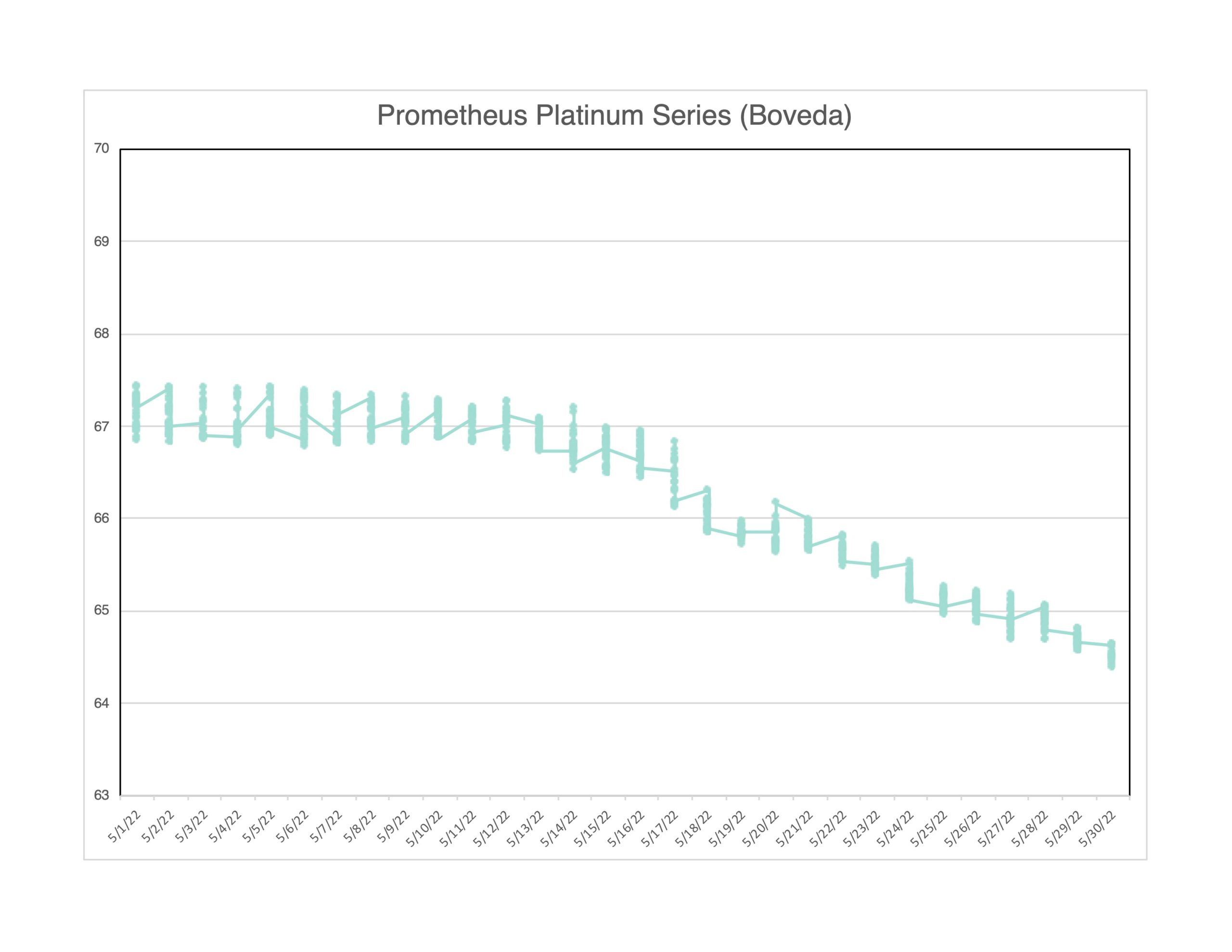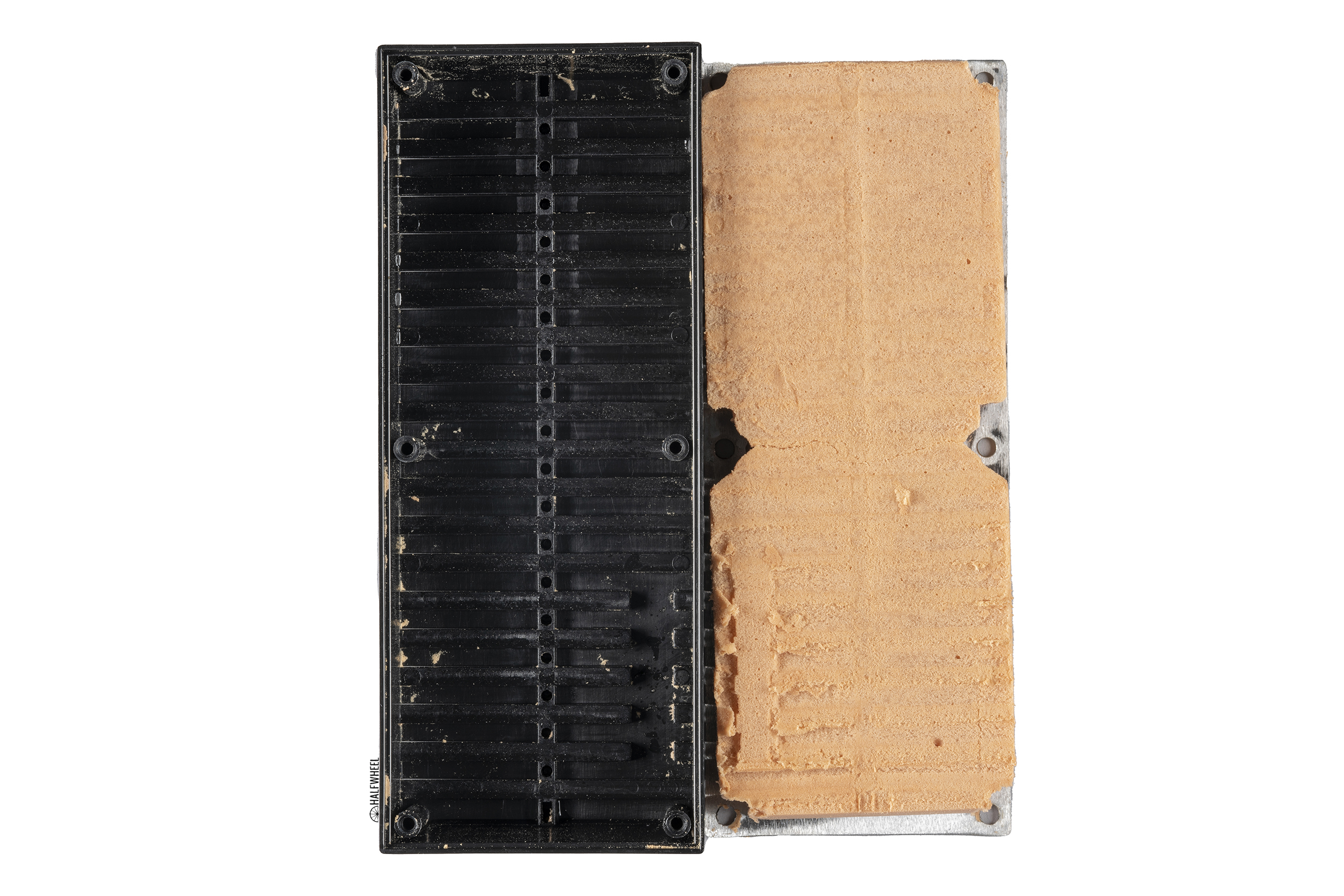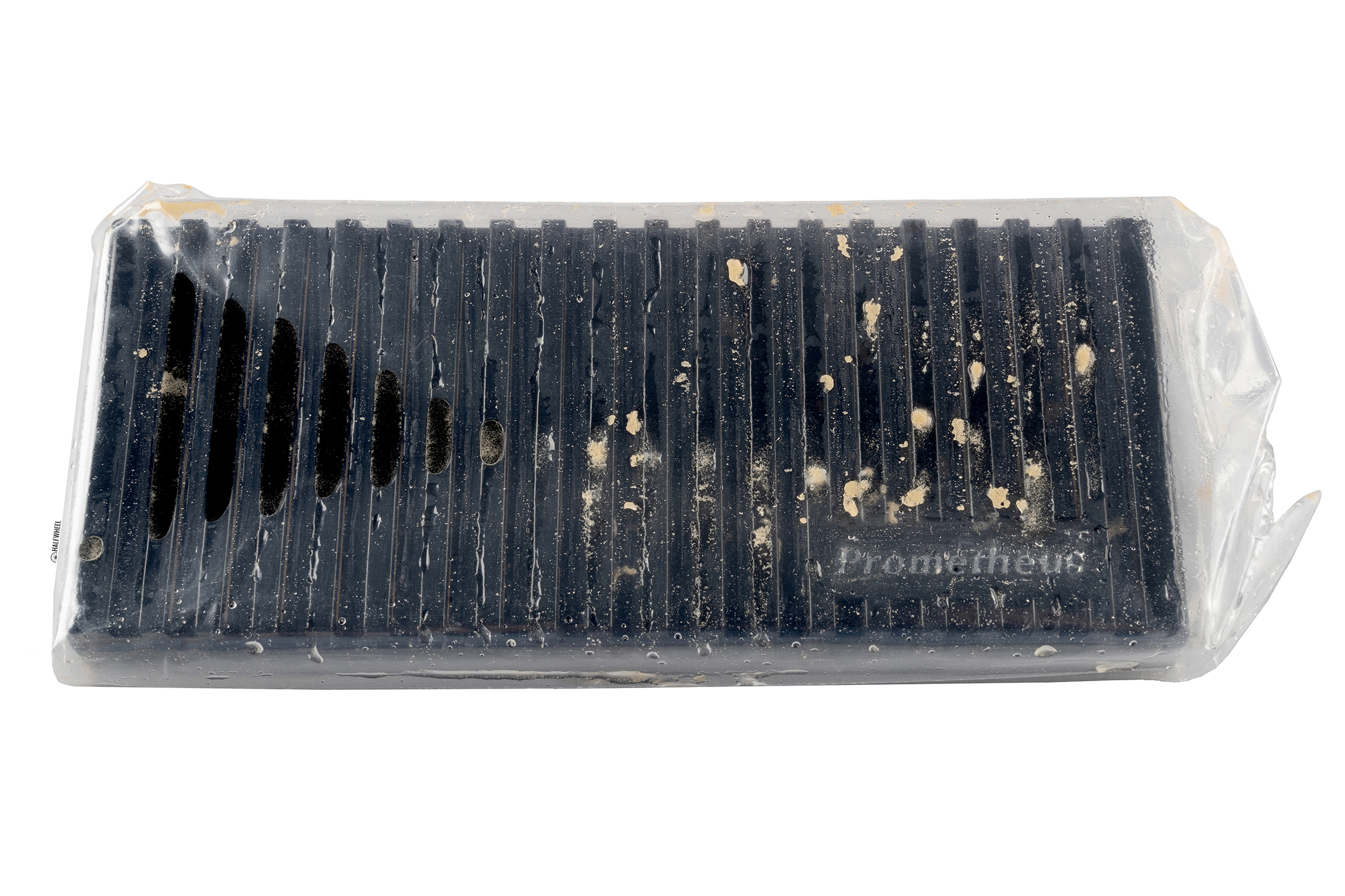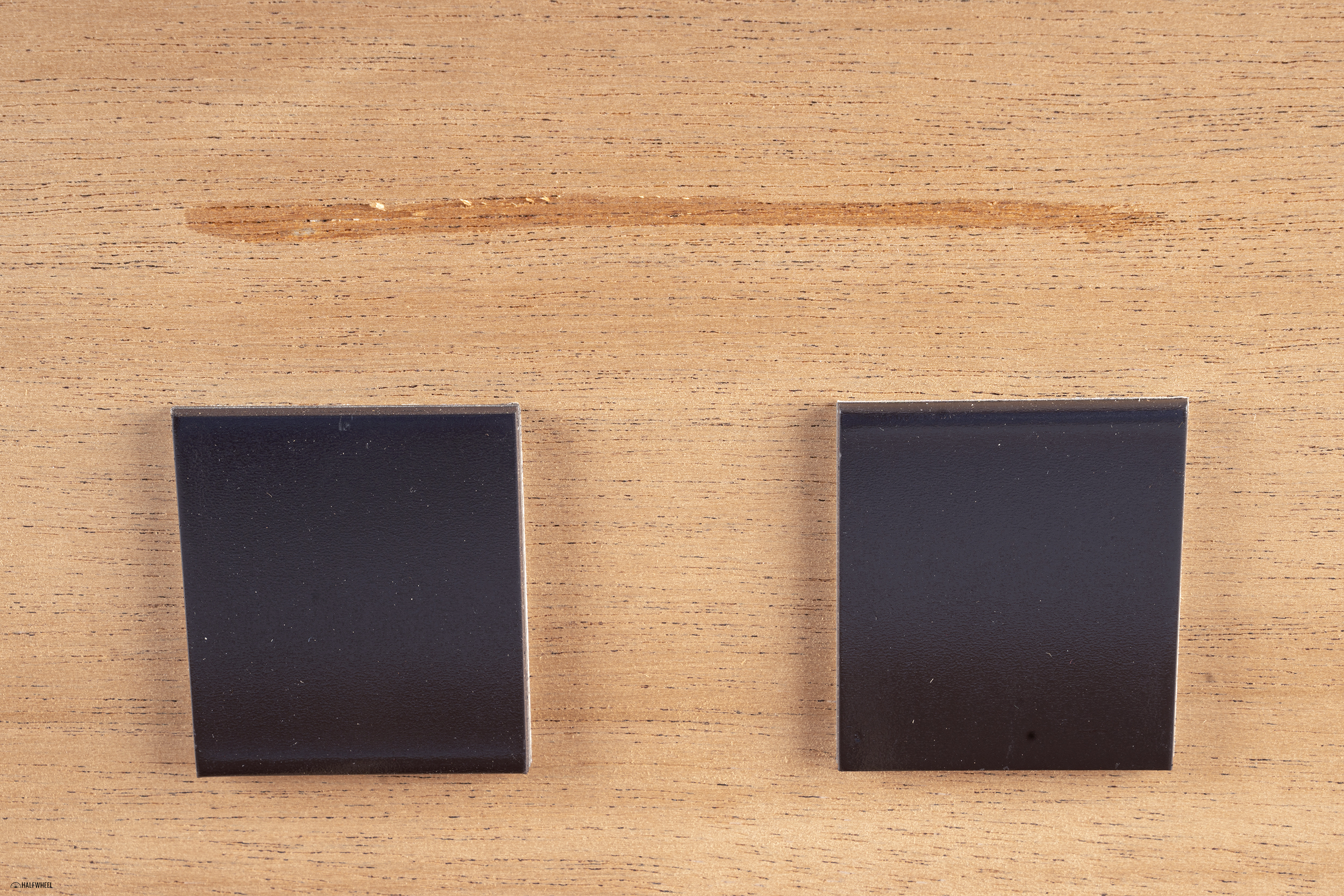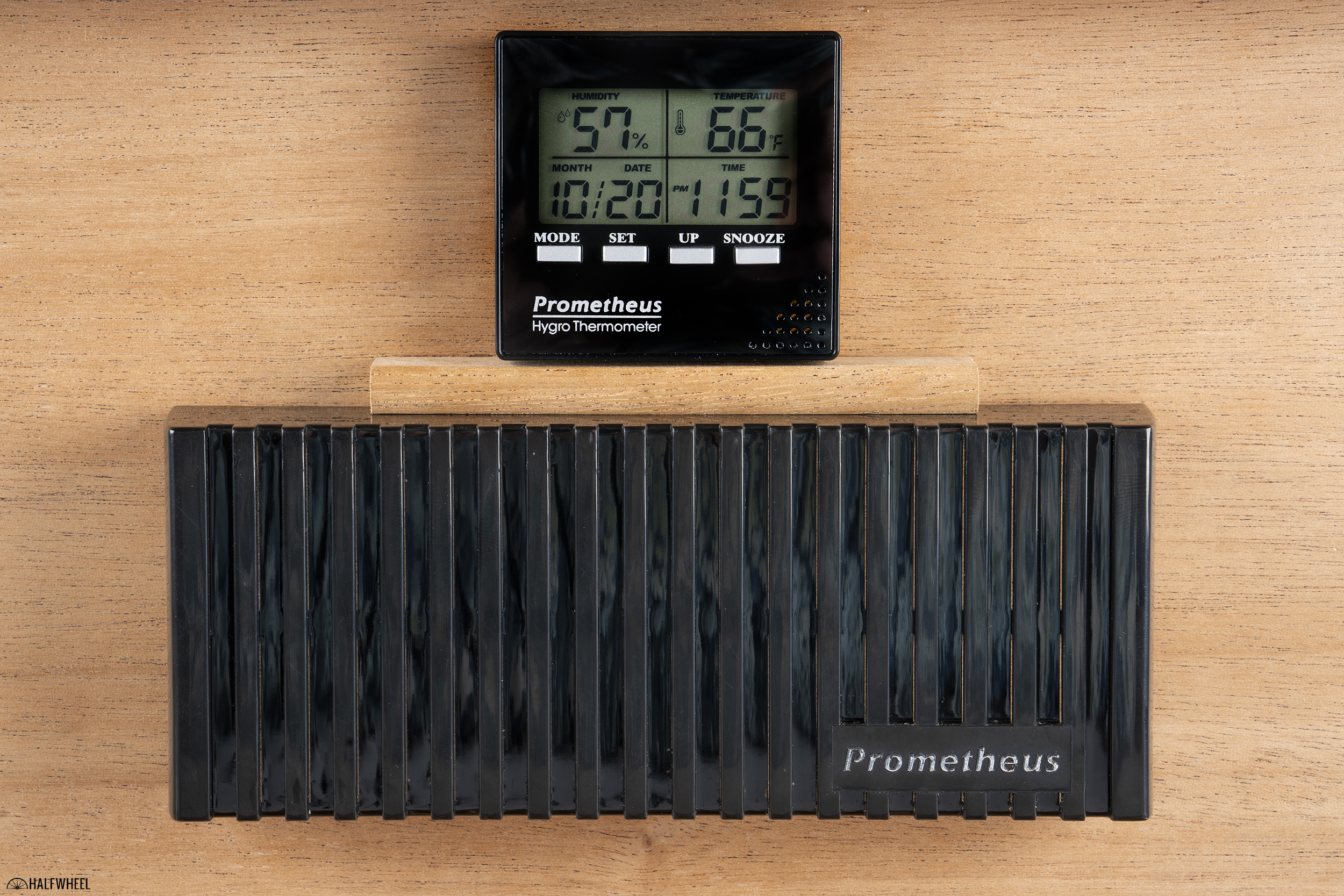This is the second of what might end up being a series of high-end desktop humidor reviews. Over the years, I’ve gawked at Prometheus’ humidors in various places, whether at trade shows or when I see them in offices. So I knew that if we were going to do a high-end humidor series, I wanted to include Prometheus.
Prometheus has sold a lot of different humidors over the years, especially if you include the ones released through Fuente Aged Selection, a joint project between the company and Arturo Fuente. These have ranged from boxes that are promoted as travel humidors to models like the one being reviewed today and even to more elaborate cabinet-style humidors. It also has the Milano and Octagon Series, which are the company’s two more affordable lines of desktop humidors.
WHAT IS IT?
Both Prometheus and I describe the Platinum Series as the company’s “flagship” offering, but it’s also sort of the standard model. Many of those Fuente Aged Selection or other limited edition Prometheus humidors appear to be modified versions of the Platinum Series. It’s a very wide desktop humidor that measures 20 inches x 9.25 x 5.75. There are currently five different finishes offered, but Prometheus has made the aforementioned limited edition versions in other finishes. One peculiar thing about those limited edition versions is that they tend to incorporate some sort of lock and key, something that isn’t present on the standard versions of the humidor.
The humidors are made in France, which is similar to both Elie Bleu and Davidoff—what I would consider the two direct competitors to Prometheus, especially here in the American market. Each humidor comes with a Prometheus Hygro 3 digital hygrometer, which measures both relative humidity and temperature, has a date/time display and even an alarm function. The 150 model comes with a single Prometheus Optima humidifier whereas the 200 comes with two Optima humidifiers. Both the hygrometer and humidifier(s) are detachable via preinstalled magnets.
HOW MUCH DOES IT COST?
$1,995.
It’s offered in five finishes: Macassar Ebony, Blue Sycamore, Red Sycamore, Yellow Sycamore and Carbon Fiber.
A larger 200-count version, the Platinum Series 200, is available in all of these finishes for $2,495.
WHAT’S INCLUDED
- Humidor
- Four removable/adjustable dividers
- Prometheus Hygro 3 Hygrometer
- Prometheus Optima Humidifier
- Two batteries for the humidifier
- Instructions
HOW LARGE IS IT INSIDE?
I measured the humidor to be 18.25 inches x 7.5 x 4.375 on the inside for a total of 598.8 cubic inches of interior volume. That doesn’t take into account any lost space for things like the humidifier or hygrometer.
Per Humidor Discount’s Humidor Calculator, this is good for 128 robusto cigars.
WHAT MAKES IT SPECIAL?
This may be more “unique” than “special,” but this is one of the few desktop humidor models that is elevated thanks to the use of four brass feet. I’m not sure this provides any functional benefits, but it does provide a more luxurious feel.
halfwheel’s Humidor Testing Process (2022 Revision)
After having some issues with the previous series of humidor reviews, I made some revisions to how humidors are tested. First, I am now using two SensorPush devices per humidor to try to overcome any issues where one of the SensorPush devices fails or runs out of battery.
Second, the process that each humidor goes through has been modified.
- Boveda seasoning packs for 14 days (Weigh before and after, use moisture meter before and after.)
- Boveda packs for 13 weeks (Weigh before and after, measure with moisture meter after.)
- (Optional Reseasoning)
- Included humidifier for eight weeks (Optional refill at 28 days, measure with moisture meter after.)
- (Optional Reseasoning)
- Two weeks inside of the dry cabinet. (Measure with moisture meter after.)
During each of these steps—with the exception of the optional refill during the included humidifier part—the humidors are closed. The only times a humidor is opened are when I’m moving from one step to another and need to switch out the humidification elements and use the moisture meter. In addition, the humidors are pretty much empty during these tests. Inside there are the two SensorPush devices, the humidification element(s) and the included dividers and/or trays, but no cigars or anything else.
I finally got Boveda to give me a more precise way to determine how many Boveda packs each humidor should receive. In short, I’m told that for every 200 cubic inches of volume, you should use one 60-gram pack and to round up to the nearest 200 cubic inches. For this humidor, I am using three packs for both the seasoning and testing processes.
The results of some of this testing are above. For this humidor, there was only one seasoning process and no reseasoning was required.
SEASONING
Prometheus says that once the humidor has reached 70 percent relative humidity, it’s ready for cigars to be placed inside of it. I didn’t follow those instructions, but the humidor seemed in a good place after two weeks of seasoning. As shown in the chart above, the seasoning nearly doubled the moisture meter readings.
BOVEDA
This shows just 30 days of performance, the same length of time I did with the Elie Bleu. The Prometheus Platinum Series did pretty well but not as well as the Elie Bleu and the Bovedas were getting close to the point of needing replacement after 13 weeks.
Interestingly, if I followed the standard Boveda approach of “one 60-gram pack per every 25 cigars in the humidor” and took Prometheus at its word that this is a 150-count humidor, that would result in me placing six Boveda packs inside. Instead, I placed just three as Boveda’s more technical guidelines are one 60-gram pack for every 200 cubic inches. I suspect the chart above would look much better with six packs.
INCLUDED HUMIDIFIER
Despite what I originally thought, Prometheus uses a foam humidifier, though the foam is very different than the typical florists’ foam. The foam is much denser, much more brittle and Prometheus uses a thicker amount of foam than most humidifiers I’ve seen. Prometheus also provides much more detailed instructions than most companies, including the recommendation that the humidifier is filled until it weighs about a half pound, which gives me a much better idea about when I need to refill the humidifier and how much distilled water to put inside of the humidifier.
The end result is a foam-based humidifier that performed much better than pretty much any other foam humidifier I’ve ever used, to the point where I wondered if it was even a foam humidifier. The humidifier comes pre-filled and in a sealed plastic bag to prevent the moisture from escaping or leaking. Prometheus’s recommendation is to have the humidifier weigh a half pound, around 226g. When I opened the humidifier it already weighed 294g, so I skipped Prometheus’ recommended procedure to fill it. Four weeks later, I opened the humidor and weighed the humidifier at 269g, still above the recommended weight, so I opted not to refill it. At the end of the eight-week test, it weighed 253g and two weeks later it weighed 246g.
DRY CABINET
I thought there was a chance that I’d be able to fit the Prometheus Platinum Series Humidor in the dry cabinet at a weird angle, but it was too wide. This test was not performed.
The Good
- Very Good Performance — While not as good as a recent Elie Bleu’s performance, the Prometheus Platinum Series performed about as good as any non-Elie Bleu humidor I’ve ever used. It’s better than the high-end Savoys and as good—and better in some areas—than the Daniel Marshall humidors I’ve used. There shouldn’t be any concerns about the ability for the Prometheus Platinum Series to keep humidity inside the box.
- Detailed Instructions — I do not believe I’ve ever seen a humidor with instructions as detailed as the ones that came with this . I think the most helpful ones are the ones related to the weight of the humidifier, though the instructions about refilling and when to use the humidor solution are also helpful. Beyond that, there’s a full page of detailed instructions about how to use the hygrometer, there are instructions about what happens if the humidity level is too high and even advice about how to remove stains from the interior of the humidor; hint, it involves sandpaper. While I didn’t use most of the procedures outlined in these instructions, I found many of them helpful.
- A Much Better Foam Humidifier — My preference is still to use pretty much anything other than foam, but Prometheus’ foam is better than most. Not only is it different foam, but I think the fact that it comes pre-soaked in a sealed bag is a much better approach than most. Furthermore, the detailed instructions about how to use it—specifically the part about how much the humidifier should weigh—make this a lot better solution than others. Still, foam humidifiers are not the most modern approach to humidifying cigars.
- This Is an Advanced Hygrometer — The hygrometer can measure temperature and relative humidity, but also has a date and time function, an alarm function—which could be helpful for reminders to refill—as well as a max/min function. While I don’t need any of these features, it’s the most feature-packed hygrometer I’ve seen in a humidor review in a few years.
- Quality Metal Hardware — I’m impressed by the hardware used for this humidor. The feet and the lid lip are the two that stand out because of their locations on the exterior, but the thickness of the hinges is what stood out to me.
- Fit & Finish — In general, the humidor we purchased is excellent. I’ve always admired the high-gloss finishes that Prometheus humidors have and the interior is, generally, no slouch either. The literal weight of the humidor—nearly 12 pounds—helps to add a real sense of quality to the humidor, one that I think is earned.
The Bad
- A Small Wooden Piece on the Lid Fell Off — Prometheus has this small piece of wood that is placed between the humidifier and the hygrometer. This piece is glued on, but our humidor showed up with it already dislodged. I’m not overly concerned with using this piece of wood, but the end result is a two-inch long glue stain. I think Prometheus should make this piece magnetic, which would avoid this problem in the future.
- It’s a Magnet for Fingerprints — Both the metal hardware and the glossy wood finish attracted fingerprints a lot more than most humidors. I find glossy humidors to be hit or mess when it comes to attracting fingerprints, this was clearly in the “lots of fingerprints” category.
- It’s Very Wide — Part of the appeal of this humidor is its unique width but that could end up being annoying for some customers because of how it limits where the humidor can be placed.
- Foam Humidification — While I found this to work better than pretty much every other foam humidifier, I still wish Prometheus used a different humidification method. In the end, even it acknowledges that the foam will need to be replaced due to declining performance over time. Prometheus charges $20 for the replacement foam, which it says will need to be replaced as frequently as once every two years and another $5 for the humidor solution. My math says it would cost $48 per year to use Boveda in these humidors, which is a lot more expensive than the cost of maintaining the Prometheus foam, but also is $48 per year in the grand scheme of a $2,000 humidor.
The Competition
The direct competitor is obviously the larger size Platinum 200 Series, which I imagine is rather similar to this humidor except for its sizes. I wish that I had more experience with Prometheus’ Octagon and Milano humidors, but I have essentially none.
Like with the recent Elie Bleu review, I figure it’s probably more useful to describe the companies that might compete with Prometheus Platinum Series humidors versus specific models:
- Elie Bleu — I recently reviewed one of Elie Bleu’s 110-count humidors and was impressed with the craftsmanship, the nearly flawless exterior of the humidor and the raw performance of the box itself. There’s one glaring issue with Elie Bleu: it uses florists’ foam humidifiers. Some of the Elie Bleu models might be less expensive than the Platinum Series, but most are going to be more expensive than the Prometheus. I don’t think you can go wrong with either brand.
- Davidoff — As of October 2022, there’s a major issue trying to buy a Davidoff humidor: I’m not sure what Davidoff has to sell you. At the moment, the only Davidoff humidor the company’s own website has in stock is the smaller size of the Air De Famille Olive Tree Humidor. We’ve been on a waitlist to try to get one of the Ziricote models since the humidor was announced last year, but they still haven’t shipped. I really hope that Davidoff’s offerings get back to pre-COVID-19 levels with the same quality. I’ve been impressed by how the humidors have looked and felt in my limited experience with them but it’s difficult to buy something that isn’t in stock.
- Vanderburgh & Co. — Vanderburgh is a company that I think is probably closer to commissioned humidors versus production models but I’ve been impressed with the couple of humidors I’ve seen in person. These are extremely heavy and likely going to cost more than double a comparable Prometheus model.
- S.T.Dupont — The French luxury lighter company is getting more and more into the humidor space. While I’ve been impressed by a few of the one-off models, I’ve yet to see a production desktop humidor that I think really competes with Prometheus or Elie Bleu.
- Daniel Marshall — If you want to save some money, Daniel Marshall makes a variety of humidors that can be had for around $1,000. I don’t think any of them will be as large as this humidor, but they are also half the price. One area where Prometheus stands out for me is the more modern design language of these humidors compared to Daniel Marshall’s designs, which tend to be more classic.
- Marc André Der Humidor — A commenter brought up this brand in a review of the Elie Bleu. The German-made humidors are not ones I’m familiar with, but the claim is that they use solid woods—instead of MDF—including both a mixture of Spanish cedar and mahogany on the inside. I’ve had mixed results with solid wood humidors, but I am always curious to try more.
- Vigilant HumiDrawer 125 Desktop Humidor ($1,885) — This is a specific model from Vigilant, a company I previously thought of as exclusively a cabinet humidor company. It’s designed to go inside a drawer, but it could be used as a standalone item. Most notably, it includes a built-in electronic humidification system, which is relatively rare for a desktop humidor. We have a Vigilant Reliance 2000 here at the halfwheel office and I have no complaints about the humidor. There’s a very good chance this smaller Vigilant humidor will get reviewed in 2023.
Should You Buy It?
Yes.
I think Prometheus offers a nice spot in between the high-end Savoy and Daniel Marshall humidors and Elie Bleu and Davidoff. What you get is a humidor that performs well and really makes a statement due to its exterior appearance. As with most high-end humidors, I don’t think this is going to make your cigars taste any better; this is really a matter of aesthetics, which is something I particularly like about Prometheus. For $2,000 you are getting—from start to finish—a more elevated experience than the $500-1,000 humidors. Whether it’s the included accessories like the humidifier or hygrometer, the detailed instructions that impressed me so much or the beautiful box—you won’t confuse this with a standard humidor, which I think is the point.
The humidor for this review was purchased by halfwheel.

